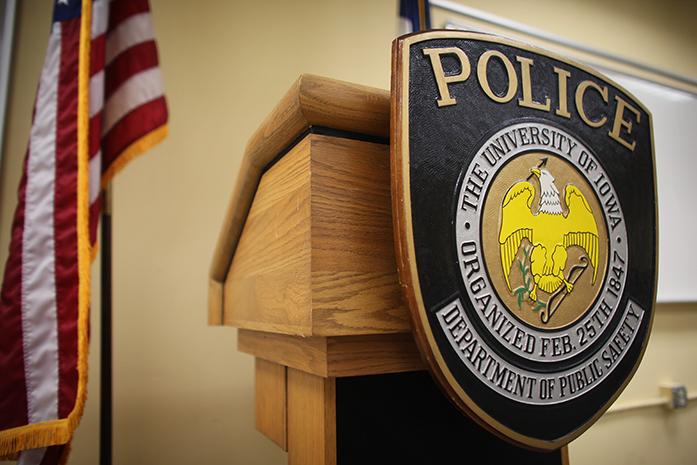By Elianna Novitch
When law-enforcement officers arrive at a scene, they need to act quickly and efficiently in order to ensure the safety of themselves and those involved. However, sometimes officers’ quick reactions are influenced by biases they didn’t know they had.
A new training program developed by the U.S. Department of Justice called Fair and Impartial Policing is being used by the University of Iowa police this semester to help officers learn to recognize their implicit biases and develop skills to reduce the influence of them.
“Honestly, I think that if you’re a human being, you should go through something like this type of training because of the way our minds work,” UI police Officer Gabby Blanchard-Shreck said. “But especially as police officers, we have to make some very difficult decisions in some very difficult situations.
“The more aware we are of how we respond to stress and of how we think, the better quality decisions we can make when responding in a split second.”
Blanchard-Shreck is one of the trainers for the program. She was sent to Davenport in March to go through the training herself and to become certified as an instructor.
“About 90 percent of our department is trained [in Fair and Impartial Policing],” she said.
Officials hope to eventually have all of Johnson County law enforcement trained in Fair and Impartial Policing.
The training for this program lasts approximately six hours and comprises three modules that trainees work through.
The first module focuses on what implicit bias is — an unconscious thought that results from one’s experience.
“Talking about implicit bias is kind of a new thing as far as police training goes,” Blanchard-Shreck said. “We don’t get a lot of this in the academy and stuff we go through for training.”
In the second module of the training, trainees discuss the community and how police officers’ decisions can have an effect on it, along with looking at the history of law enforcement and its influence in implicit biases.
The final module is centered on group work that includes listening to testimonials about experience with biases, watching videos, and playing roles in different scenarios.
One example of a scenario used in the training is a call about a domestic assault in which two females and one male are involved. The victim is female.
“What we describe to the officers is that when they get to the scene, they see two females and one female is comforting the victim while the male is sitting near them looking distraught,” Blanchard-Shreck said. “Most of us would assume that it was the guy that hit the girl in this scenario because of implicit bias. However, at the end of the exercise we reveal that the two females are a couple and that the female was actually the aggressor in this scenario, not the male.”
Officials hope that Fair and Impartial Policing will change how situations regarding the community and law enforcement are addressed.
“Our department needs to have the trust and support of campus in order to promote safety and truly be an effective resource on this campus,” said UI Assistant Vice President for Public Safety Scott Beckner in an email statement to The Daily Iowan. “This training will help our officers practice policing strategies that not only promote safety but build positive relationships with the students, faculty, and staff we serve.”
Though this training is a step toward neutral treatment of those involved in a situation that requires law-enforcement presence, it is not guaranteed.
“Biases don’t just go away even if you are taught to recognize them,” said UI student Omar Khodor. “I don’t expect there to be a sudden change, but I think it is important that they are trying to educate people and address the problems that biases cause and have caused with law enforcement.”



